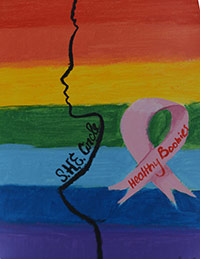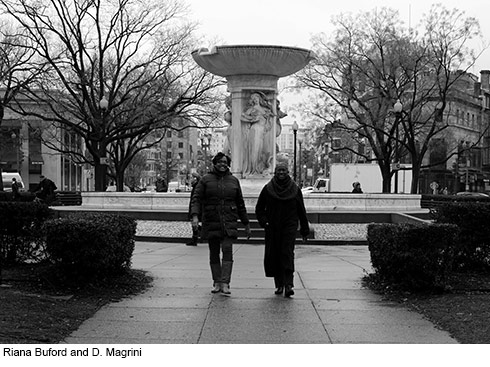The Susan G. Komen Foundation provided funds for this important research. Based on data from more than 600 participants, two former Mautner staffers—Deputy Director and Research Director Amari Sokoya Pearson-Fields, along with Spirit Health Education Project Coordinator and Systems Administrator Amikaeyla M. Proudfoot Gaston—founded S.H.E. Circle, which combines the concepts of spirit, health, and education (S.H.E.).
Pearson-Fields and Gaston sent a grant proposal to the Centers for Disease Control and Prevention and received approval to develop a five-year pilot. Next, they created a specific curriculum geared toward health, spirit, and culture for African-American lesbians and bisexual women.
Now nine years old, S.H.E. Circle still focuses on this population and accepts participants regardless of their socioeconomic status or with whom they are currently partnering. Two vibrant women are behind the program’s continued growth and community outreach. Associate of Educational Programs Riana Buford has been with Mautner Project for more than three years. D. Magrini is the Health Education Program Director and a Mautner staffer for more than seven years.
“On the scale of identification, ‘Black’ is always first,” states Buford. “I wanted to educate my friends who are African-American lesbians, but health is seventh on their list of things they think about. If I can drop a jewel to make them think, then it’s worth it.”
Adds Magrini, “We make a really good team, and I’ve just been blessed in that way. We have the different view of age. Sometimes it’s nice to have your ‘mom’ in the room, and sometimes not so much. There are some folks I’m going to be effective with, and some folks she will.”
Both of S.H.E. Circle’s dynamic leaders train and introduce the curriculum to new presenters and groups across the country, traveling to such cities as Chicago, Florida, North Carolina, and Philadelphia. During these training sessions, Buford and Magrini pass along their “team approach” concept. They encourage each of the new presenters to pick a co-presenter who is different from them so that they can cover more ground and reach more women in the community. All learn the same S.H.E. Circle curriculum as their foundation.
The S.H.E. Circle comprises six sessions, or modules. Some of these include information on breast health, colorectal cancer, coming out, nutrition and fitness, and smoking cessation. And, both women are very clear that the program’s spiritual component doesn’t necessarily mean “God” or organized religion. Their goal is to help participants become—and stay—healthy, and they respect each individual’s specific affirmation. Buford and Magrini agree that “spirituality is what moves you.”
 Why S.H.E. Circle? General providers deal with many different populations and demographics. S.H.E. Circle specifically educates African-American lesbians and bisexual women about their particular health risks, pointing out how they might differ from those of their heterosexual counterparts. In turn, participants become better advocates for themselves.
Why S.H.E. Circle? General providers deal with many different populations and demographics. S.H.E. Circle specifically educates African-American lesbians and bisexual women about their particular health risks, pointing out how they might differ from those of their heterosexual counterparts. In turn, participants become better advocates for themselves.
“Sometimes we hesitate to go to physicians,” remarks Magrini. “You may not go to a doctor unless something hurts you. I need you to go before things hurt. I need you to do a regular screening. I want you to know so that you can educate your doctor.”
One of the great ongoing benefits of S.H.E. Circle is that the learning doesn’t end with the women who come to the sessions. When participants see their health professionals and share their newfound knowledge with people who might not be lesbian or bisexual, the flow of information continues further into the community.
Buford and Magrini look forward to bringing their program to many more women across the country. For additional information about S.H.E. Circle, visit their website at www.shecircle.org.
Photos by Deanne Jenkins


